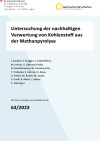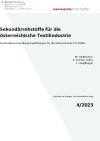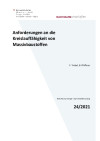Suchergebnisse
Entlacken als Dienstleistung
Entwicklung der Dienstleistung der Entlackung in industriellen Oberflächenbehandlungsanlagen auf Basis von impulsgesteuertem Hochdruckwasser mit neuartiger, energieeffizienter Hochdruckwasserpumpe. Suche und Evaluierung von weiteren Anwendungsmöglichkeiten.
Optimierte Erstarrung mittels metallischem Kühlmittel
Entwicklung eines neuartigen Kühlverfahrens auf Basis eines metallischen Kühlmittels für einen optimierten Erstarrungsprozess beim Al-Bandguss, welches zur nachhaltigen Einsparung von eingesetzten Rohstoffen, Wasser und fossilen Brennstoffen führt. Gleichzeitig wird die Produktqualität verbessert.
Untersuchung der nachhaltigen Verwertung von Kohlenstoff aus der Methanpyrolyse

Eine der möglichen alternativen Produktionsrouten für erneuerbaren Wasserstoff ist die Methanpyrolyse. Gegenüber anderen, alternativen Erzeugungswegen weist die Methanpyrolyse bei einer sehr hohen Wasserstoffausbeute den geringsten Energieaufwand (weniger als ein Viertel der Wasserelektrolyse) auf.
Schriftenreihe
63/2023
J. Burkert, K. Brugger, L. Haberfellner, M. Lehner, R. Obenaus-Emler, R. Hood-Nowotny, M. Puschenreiter, T. Prohaska, S. Zabrian, N. Alaux, A. Passer, M. Ruschi, M. Saade, S. Duelli, R. Maier, J. Mayer, K. Steininger
Herausgeber: BMK
Mehrsprachig, 88 Seiten
Downloads zur Publikation
Optimierung der Ressourceneffizienz der Holznutzung
Modellierung der Holzverarbeitungsprozesse zur Darstellung der Auswirkungen von Entwicklungen auf die Leistungscharakteristik
Verfahren zur Ausschussverminderung in der Papierindustrie
Entwicklung eines Prüfverfahrens, das die Kopiereigenschaften von Papier bereits während der Produktion erkennt und somit zur Verminderung von Ausschuss und zur Energieeinsparung beiträgt.
Sekundärrohstoffe für die österreichische Textilindustrie - Kurzstudie mit Handlungsempfehlungen für die österreichische FTI-Politik

Die Studie befasst sich mit den Herausforderungen und Potenzialen für den Einsatz von Sekundärmaterialien in der österreichischen Textilindustrie. Auf Basis einer breiten Stakeholdereinbindung werden Herausforderungen und Potenziale zur Etablierung von Kreisläufen in der Textilindustrie mit Fokus auf den Einsatz von Sekundärmaterialien in Österreich benannt. Darauf aufbauend wurden Handlungsempfehlungen für Forschungs- und Entwicklungsaktivitäten zur Forcierung der Kreislaufführung formuliert.
Schriftenreihe
4/2023
M. Feldbaumer, K. Granzer-Sudra, E. Ganglberger
Herausgeber: BMK
Deutsch, 78 Seiten
Downloads zur Publikation
ZERMET - Zero Emission Retrofitting For Existing Textile Plants
Minimisation of the consumption of water, chemicals and energy in the textile industry. Further development of the ZERMEG approach in the form of a questionnaire and application in the textile industry.
ZERMET - Zero Emission Retrofitting For Existing Textile Plants
Minimierung des Einsatzes von Wasser, Chemikalien und Energie in der Textilindustrie. Weiterentwicklung des Ansatzes von ZERMEG in Form eines Fragenkatalogs und die Anwendung auf die Textilindustrie.
Anforderungen an die Kreislauffähigkeit von Massivbaustoffen

Die Studie zeigt aktuelle Herausforderungen, Chancen und Potenziale in Bezug auf die Kreislauffähigkeit der Massivbauindustrie sowie die mit ihr agierenden Akteur:innen auf. Darauf aufbauend wurden zukünftige Aktionsfelder notwendiger Forschung und Entwicklung zur Förderung der Kreislaufwirtschaft im Bereich mineralsicher Baustoffe herausgearbeitet.
Schriftenreihe
24/2021
F. Trebut, B. Pfefferer
Herausgeber: BMK
Deutsch, 59 Seiten
Downloads zur Publikation
ZERMEG - Zero Emission Retrofitting Of Existing Galvanizing Plants
Methodischer Ansatz zur rigorosen Optimierung von bestehenden Anlagen der Oberflächentechnik mit dem Ziel eines emissions- und abwasserfreien, sowie kostengünstigen Betriebes, Hintergrunddaten zur Optimierung und drei Fallstudien.
Entwicklung einer Pulverbeschichtungsanlage für Holzwerkstoffe
Es soll eine Demonstrationsanlage entwickelt werden, mit welcher erstmalig Holzwerkstoffe (hauptsächlich MDF) mit Pulverlack mit hohen Aushärtegraden und bester Qualität mit einem industriellen Verfahren beschichtet werden können.
ZERMEG - Zero Emission Retrofitting Of Existing Galvanizing Plants
Method to optimize existing galvanizing plants consequently with the goal of zero emission and zero waste enterprises, to minimize operating cost including benchmarks and three case studies
Holzbearbeitung mit Überlagerung einer Ultraschall-Wechselbeanspruchung
Entwicklung von Verfahren zur Holzbearbeitung unterstützt durch hochfrequente Ultraschallvibration in Hinsicht auf Anwendungen in der holzverarbeitenden Industrie.
Bio-R: Applications for treating Cellulosic bodies with supercritical carbon dioxide
The target of this project is the screening of the opportunities, resulting of the combination of treating Cellulosic bodies with supercritical carbon dioxide. In general, the change of the porous structure depending on the way of fiber drying and the opportunity to incorporate active compounds and the development of analytical methods to track them within Cellulosic bodies.
NATHPRO: Development of NATural fiber High performance pultrusion PROfiles (SUSPRISE Joint Call)
Development of strong, light, weather and heat resistant natural fiber profiles by combining the the advantages of a pultrusion technology with the advantages of natural fibers.
Apple & pear cascade: more value added in the Mostviertel region through bio-cascading
Creating a concept for the bio-cascading of apple and pear pomace in the Mostviertel region for an increased value added through innovative local products. Development of strategies for the implementation of a pilot plant.
Wood-processing employing a superimposition of ultrasonic vibrations
Development of wood-processing techniques employing high-frequency ultrasonic vibrations in terms of applications in the woodworking industry.
Abwärmenutzung und Einsatz erneuerbarer Energieträger in einem metallverarbeitenden Betrieb
Abwärmenutzung und Deckung des verbleibenden Energiebedarfes zu 100% aus erneuerbaren Energieträgern Biomasse und Wasserkraft in einem metallverarbeitenden Betrieb
New solvents and processes for post-combustion CO2 capture
New and better solvents for CO2 absorption can reduce the costs of Carbon Capture and Storage significantly. Therefore, the ability to absorb CO2 and the vapour - liquid equilibrium curve of different new solvents will be determined in the laboratory and under real operating conditions at a power plant. Furthermore, the achievable CO2 removal efficiency of spray towers will also be investigated for different solvents.
Äpfel & Birnen Cascade: Mehr Wertschöpfung für das Mostviertel durch Kaskadennutzung
Entwicklung eines Konzepts zur kaskadischen Nutzung von Apfel- und Birnentrester im Mostviertel zur Erhöhung der regionalen Wertschöpfung. Erarbeitung von Strategien für die Umsetzung in Form einer Demonstrationsanlage.
